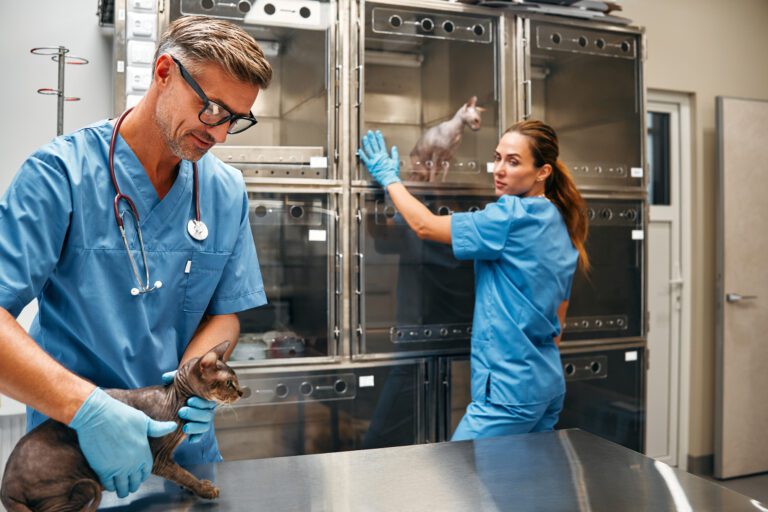It seems like only yesterday when you were turning up for your first day of vet school. Then suddenly, it’s not long until graduation and you realise it’s time to find your first graduate vet job. It’s important to have a set of questions ready to ask at your first Veterinary graduate job interview.
As a new graduate, it’s important to find a job that suits you. An interview is a 2-way process, and you must ensure you choose the right job as your first vet job. At the same time, employers want certain traits from a graduate vet you need to ensure the practice is the right one for you.
Preparing for a veterinary job interview
Approaching a veterinary job interview, especially for a role you’re passionate about, can be daunting. However, proper preparation is your best tool for success. Let’s look at a couple of interview tips for how to best prep.
Explore the veterinary practice with in-depth research
To ace your interview, thorough research on the veterinary practice is key. Familiarise yourself with the clinic’s history, culture, and the team you might join by exploring the practice’s online presence.
How to research a veterinary practice:
Explore the practice’s online presence: These are the obvious first places to start. Start by browsing through their website and social media profiles. This will give you more insight into their mission, values, and recent activities. Go through their blog, recent news or any updates that could give you an insight into their activities and priorities.
Get to know the team: Check out the profiles of veterinarians and staff members on platforms like LinkedIn. Understanding their expertise and backgrounds can give you a sense of the team dynamics. LinkedIn profiles of key staff members are a great place to scope out information about their backgrounds and professional accomplishments.
Client reviews: Look for feedback from clients on platforms such as Google and the practice’s website. This can provide valuable insights into the practice’s reputation and client satisfaction. It’s helpful to try to get a sense of whether patients feel well cared for by the clinic. You want to find a team that treats its patients with the utmost care and respect.
Practice your interview responses
While it may feel awkward, rehearsing your answers to potential interview questions can significantly boost your confidence and clarity. Drawing from our detailed interview tips, practice aloud to refine your responses.
Here are a few tips:
- Practice aloud: Conduct mock interviews, perhaps in front of a mirror, to refine your responses, facial expressions, tone of voice and body language. This will help you articulate your thoughts more clearly and boost your confidence
- Tailor your answers: Draw connections between your experiences and strengths and the clinic’s culture and mission.
- Utilise the STAR method: Structure your responses to behavioural questions using the Situation, Task, Action, Result approach for clarity and focus. This keeps your storytelling focused and emphasises your problem-solving nature.
While you prepare, maintain a positive and confident mindset. Remember, the aim isn’t to recite answers verbatim. Authenticity and composure are key during the interview. Engage in thorough research and practice your responses, but don’t become overly fixated to the point where you lose your individuality and spontaneity. Your unique spark is what sets you apart, so let it shine through naturally.

Veterinary interview questions new graduates need to ask
To make a lasting impression, come prepared with insightful questions for your interviewer. This shows how proactive and engaged you are, and it easily sets you apart from the rest of the pack.
To help you prepare, here are ten questions to ask in an interview.
1. How does the typical working day run?
This is a great question to ask, as it gives you a better sense of what your daily schedule will look like.
Examples of things you could ask include
- Can you describe a typical day or week in this position?
- How is the workload distributed among the veterinary team?
- Understand work-life balance in the practice.
- Set realistic expectations of the workload and what will be expected of you.
- See whether the clinic is a cultural fit.
2. Can you describe the team I’ll be working with?
Time and time again, the people we work with make or break a job. Getting a sense of the team you’ll be working with is crucial for understanding how well you’ll like the job. By asking the interviewer to describe the team, you’ll gain insight into their personalities and overall team dynamics.
3. What support do you provide and what are the opportunities for personal growth and development?
As a recent graduate, you have a long, wonderful career journey ahead of you. By asking about future professional opportunities, you show that you are forward-thinking, committed, proactive and growth-oriented.
Asking about support is THE most important thing to enquire about. Examples of things you could ask include:
- Will I be allowed any extra time for consultations initially?
- What help would I get with surgery?
- Would there be people I could speak to if I was unsure about a case?
- What support will there be for me during out of hours? Would there be someone I could contact if I was stuck?
- Will there be any periods of sole charge?
4. How do you handle emergency cases?
This is a great question to ask, and it will help you understand the realities of the industry and give you an intimate insight into this practice.
Learn about their protocols and readiness for handling emergencies, as most clinics and practices face emergencies regularly, and working in a well-organised and safe environment is important.
5. What are the client demographics and common cases you handle?
By asking this question, it will help you understand the types of animals and cases you’ll most frequently encounter. Are patients primarily small animals and pets, or are you working in a rural context with farms and large animals?
6. How is success measured in this role?
It would be beneficial to understand what your KPI’s (key performance indicators) would look like. The transition from school to the workforce is a big challenge. You have been used to getting regular feedback on your performance by getting feedback on what your grades were, but that kind of structure doesn’t exist in the workplace. That’s why knowing exactly what is expected of you from the get-go is so important.
7. What are the most challenging aspects of this job?
Everyone will experience challenges in the workplace differently. By asking this question, it might help you gain a realistic expectation of the role and will give you insights into some of the employer’s pain points. You could then share examples of how you would deal with stressful situations and share ideas for how to mitigate the issues.
8. How does the practice support continuing education?
As a new graduate entering your first vet job, you want to look for clinics that offer mentorship programmes, regular workshops, and seminars and that invest in continuing education opportunities.
Continuous learning is key in veterinary medicine, where new research, technology, and best practices are constantly developing. Dynamic clinics and practices prioritise and encourage employee growth.
9. What are the practice’s values?
Since you have thoroughly researched the practice, you could also tailor this question to be more specific. I gathered the practice values X, Y, and Z; how does this inform your day-to-day work?
By doing this, you will show that you prepared for the interview and provide the interviewer with the opportunity to share their experiences. You want to pay attention to how well the clinic implements its values and mission.
10. Can you tell me about the practice’s approach to work-life balance?
It’s no secret that many veterinarians experience significant burnout and mental health is one of the major talking points. As you interview for jobs and try to find your perfect match, keep a close eye out for those that prioritise work-life balance and employee well-being.
What to anticipate during a veterinary job interview
In addition to answering questions, anticipate technical queries about your veterinary knowledge and practical skills. Be prepared to discuss your communication abilities as well as client interactions and interpersonal skills. By doing your research and practicing your answers, you will be well-prepared for the interview.
Here are a few other tips for what to anticipate during a veterinary job interview:
- Technical questions: Be prepared for questions about your veterinary knowledge, technical skills, and work experience. This may include discussions about vaccinations, surgical procedures, spaying and neutering, and general medical care.
- Client communication and interpersonal skills: transferrable skills are just as important as clinical and technical skills. Given the client-facing nature of veterinary roles, be prepared to discuss how you communicate with pet owners, manage your time effectively, explain medical conditions, and handle difficult situations (like the need for euthanasia) with empathy.
- Facility tour or observation: You may be given a tour of the facility or have the opportunity to observe the daily operations; therefore, you want to use this as an opportunity to ask questions and better understand the work environment.
Don’t forget the importance of following up after the interview with a thank-you email to express your gratitude for the opportunity.
As you embark on this exciting journey, remember the dedication and effort you’ve put into reaching this point. Let your passion for veterinary medicine shine through, and you’ll be well on your way to securing your dream job.

